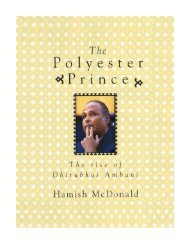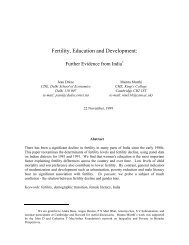Create successful ePaper yourself
Turn your PDF publications into a flip-book with our unique Google optimized e-Paper software.
company shares out and make you collapse. I am bigger than your exchange. If the<br />
newspapers criticise, he can point out they are dependent on his advertising and he<br />
has his journalists in every one of their departments. If the political parties take a<br />
stand against him, he has his men in every party who can pull down or embarrass<br />
the leaders. He is a threat to the system. Today he is undefeatable. Surprisingly, the<br />
role played by Dhirubhai Ambani received only cautious side-references in most<br />
books about contemporary Indian politics. No biography of him was in the<br />
bookshops, although Indian journalists and commentators had produced 1quickie’s<br />
biographies of other new celebrities in vast numbers. <strong>The</strong> work of the economic<br />
historians largely cut out in the 1960s. <strong>The</strong> few biographies of other Indian<br />
businessmen were commissioned works, not very well written, and notable for a<br />
worshipful attitude to the subjects. No one drank, cursed, cheated or philandered.<br />
<strong>The</strong>ir workers were all part of the family. Almost everyone lived an abstemious<br />
vegetarian life, accumulating wealth only to give it away to temples, hospitals and<br />
schools.<br />
By 1992, Reliance was tapping investors in Europe for funding, and international<br />
investment funds were being allowed to play the Indian share market directly. A few<br />
years later, the company had started borrowing in New York on a large scale. <strong>The</strong><br />
Ambani story was becoming of greater interest outside India, at least to investors<br />
and perhaps to a wider audience watching the explosive growth of capitalism across<br />
Asia. <strong>The</strong> idea of this book occurred in 1992, and I put it to Dhirubhai Ambani later<br />
that year at a second meeting in his Bombay office. Ambani seemed receptive, and<br />
agreed that his life story could be inspiring for a younger generation of Indians as<br />
well as interesting to those thinking of dealing with India. I left the meeting with an<br />
understanding that he had agreed to talk about his life at meetings to be arranged<br />
and that, if so, I would show him the completed draft as a courtesy and listen to any<br />
objections-but retain the final say on the content. <strong>The</strong> book would not be credible<br />
otherwise, Ambani concurred.<br />
A year slipped away without further progress, and then relations with Reliance took a<br />
downturn. By the end of 1993, Reliance was in the bidding for several oilfields in the<br />
Arabian Sea. <strong>The</strong> government oil search corporation had discovered the fields but did<br />
not have the funds to build the huge production rigs, gas compressors and pipelines<br />
that were needed. Several contacts among rival bidders were alleging that the<br />
tender was being rigged in favour of Reliance. Indian politicians and bureaucrats are<br />
masters at tilting an ‘pen and transparent’ tender into a one-horse race, by<br />
techniques such as keeping the weighting of bidding factors uncertain or secretly<br />
promising later con-cessions to compensate for underbidding. In the event, Reliance<br />
swept the field, and a director with one of the losers told me: ‘we were shafted, and<br />
for the wrong reasons.’<br />
Writing about this would not advance my request for access to the Ambanis for the<br />
book, but my duty was to the magazine that employed me. <strong>The</strong> first of two articles<br />
in the Far Eastern Economic Review about the oilfields battle drew a bitter complaint<br />
from Anil Ambani that the report was ‘defamatory’ a complaint not sent directly to<br />
me, or to the magazine, but in a letter sent to the head of one of the rival<br />
companies, the Australian resources giant BHP, and copied to the heads of the<br />
American and Australian diplomatic missions in New Delhi.<br />
<strong>The</strong>reafter, I wrote occasionally about Reliance and, in July 1995, left my job with<br />
the magazine to spend more time on the book. A letter to Dhirubhai Ambani<br />
informing him of this move went unanswered. Over the following 18 months, the




